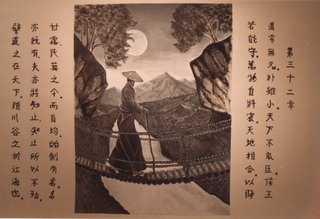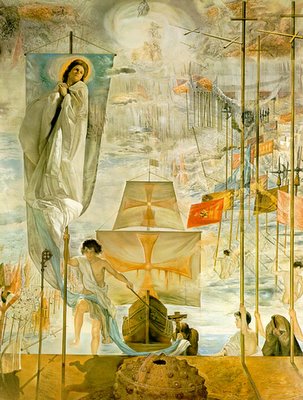
Tuesday, January 31, 2006
Monday, January 30, 2006
Sunday, January 29, 2006
Deja Digerati

Pre-order the book before February 14th
and save 10%, shipping included, for only $14.32.
This is a special, limited-time offer.
Order Here: Three Candles Press
Digerati: 20 Contemporary Poets in the Virtual World
Release Date: February 14, 2006
330 pages, price $15.95,
ISBN: 0-9770892-2-3
Peter Pereira
Eduardo C. Corral
Aaron Anstett
Paul Guest
Alison Pelegrin
Teresa Ballard
RJ McCaffery
Seth Abramson
Nancy Eimers
Anthony Robinson
Deborah Keenan
Tony Trigilio
Lee Ann Roripaugh
Shanna Compton
Jake Adam York
Michael Meyerhofer
Matthew Shindell
Jacqueline Marcus
William E. Stobb
Frank Matagrano
---------------------------------------------
* Tip of the hat to Steve Mueske who put it all together.
Saturday, January 28, 2006
Christina Patterson Asks: Is poetry the new Prozac? - Question is for whom?
· A recent study in the journal Psychological Reports, suggested that writing poetry boosted levels of secretory immunoglobin A.
· Another, undertaken by a consultant at Bristol Royal Infirmary, concluded that poetry enabled seven per cent of mental health patients to be weaned off their anti-depressants.
· Poetry, it seems, is not the new rock'n'roll, but the new Prozac.
But writing it is not necessarily beneficial for poets:
“Many poets - a higher proportion, apparently, than of the average population - are not so lucky. John Clare, Anne Sexton, Robert Lowell and, most famously, Sylvia Plath, all knew the torments of a mind that would, on occasion, burst out of the crucible of what Freud called "normal human misery" into the nameless horrors of mania. The mad poet may be a cliché, but it is not a myth. Poets continue to write of their experiences of mental illness. If poetry is some kind of wonder-drug, it sure ain't working for them.”
So who’s forwarding theories like the ones above? According to Patterson it’s the arts administrators and they're doing it for money. (Of course it’s all for a good cause.) But in order to get the money, they need to go to the funders with evidence via studies that support their assertions. How much of this “research” is “anecdote masquerading as science” depends on which side of the fence your on I guess.
Patterson concludes with the following: “There is, in the right hands, a fine role for poetry as social work, but let's not pretend that it's the same as poetry as art. Poetry, like all art, is not a panacea. Perhaps it's more like homeopathy. A great placebo - some people swear by it - but the studies are inconclusive.”
Friday, January 27, 2006
Say Isn't This Supposed to be a Poetry Blog?
Six Weeks After
by Maxine Kumin
two roistering dogs splayed me flat
on frozen turf shattering six ribs
consigning me to gray walls, bleak thoughts
I'm up and about , hitching from place to place
and I see the common coarse-grained stones
have not given up their good seats in the wall
though the deckle-edged daffodils came and went
while I motored my rented bed up and down
and I see the greening margin along the road
is shaggy and unshorn and the goldfinches
have exchanged their winter costumes
for strobic lozenges of yellow that brighten
the window feeder and an indigo
bunting has brought his electric blue
to my sphere so that each time the rose-
breasted grosbeak alights for a sunflower chip
I am stunned into wholeness, healed
by a wheel of primary colors.
------------------------------------------------------
Shenandoah: Vol 55 - No. 3 - Winter 2005
Thursday, January 26, 2006
Wednesday, January 25, 2006
The Straussians Are Coming! The Straussians Are Coming!

I
Donald Gutstein wrote an intriguing article for “The Tyee” a B.C. alternative daily newspaper. In it he draws some interesting analogies between Stephen Harper & George Bush: “What do close advisors to Stephen Harper and George W. Bush have in common? They reflect the disturbing teachings of Leo Strauss, the German-Jewish émigré who spawned the neoconservative movement. …In Washington, Straussians exert powerful influence from within the inner circle of the White House. In Canada, they roost, for now, in the so-called Calgary School, guiding Harper in framing his election strategies. What preoccupies Straussians in both places is the question of "regime change."
Who was Leo Strauss? Leo Strauss (September 20, 1899 – October 18, 1973), was an American conservative political philosopher of German-Jewish extraction, who specialized in the revitalization of classical philosophy and founded an intellectual school, Straussianism, during his decades at the University of Chicago.
Strauss called his field Political Philosophy. But for him political philosophy and philosophy were necessarily intertwined at their roots. Like many philosophers since the second world war, he did not believe in trying to distinguish facts and values in philosophy and he was against positivism.
Strauss taught that Liberalism, strictly speaking, contained within it an intrinsic tendency towards relativism, which in turn led to a sort of nihilism--a kind of decadence, value-free aimlessness, and hedonism which he believed he saw permeating through the very fabric of contemporary American society. In the belief that 20th century relativism, scientism, historicism, and nihilism were all implicated in the deterioration of modern society and philosophy,… (source Wikipedia)
Strauss believed in the inherent inequality of humanity. Most people, he famously taught, are too stupid to make informed decisions about their political affairs. Strauss believed that allowing citizens to govern themselves will lead, inevitably, to terror and tyranny, as the Weimar Republic succumbed to the Nazis in the 1930s. Elite philosophers must decide on affairs of state for us. (George this does not mean you!) They must resort to deception -- Strauss's "noble lie" -- to protect citizens from themselves. The elite must hide the truth from the public by writing in code. "Using metaphors and cryptic language," philosophers communicated one message for the elite, and another message for "the unsophisticated general population,". … "For Strauss, the art of concealment and secrecy was among the greatest legacies of antiquity."
Apparently, according to Gutstein, there is an elite inner circle of Staussians in the White House and another in place in the so-called Calgary School, waiting to exert their influence in guiding Harper when he is firmly ensconced in Ottawa. These Canadian Straussians claim that “The Canadian Charter of Rights and Freedoms is the end result of a conspiracy foisted on the Canadian people by "special interests." These nasty people are feminists, gays and lesbians, the poor, prisoners and refugee-rights groups who are advancing their own interests through the courts at the expense of the general public." This is a common Straussian technique: “deception by omission” where the weak are targeted while the real culprits disappear.
As noted, what also preoccupies Straussians in both places is the question of "regime change”. "Strauss defined a regime as a set of governing ideas, institutions and traditions. …Usually regime change is imposed on a country from outside through violent means, such as invasion (i.e. Iraq etc…). On occasion, it occurs within a country through civil war. …Is regime change possible through the electoral process? It's happening in the U.S., where the neocons are succeeding in transforming the American state from a liberal democracy into a corporatist, theocratic regime. " As Canada readies for a new federal government, the question is: Are we next?
III
How much of this reportage is Gutstein’s own private brand of political paranoia and how much is based in fact is pretty hard to ascertain given that the “Straussians” seem to function best in a covert manner - a la “Freemasons”. The fact that both leaders may in effect have advisors that ascribe to this school of thought does not in and of itself mean that there is a secret agenda or that they all belong to some “Masonic Lodge”.
Harper’s views and the political platform that he delineated during his recent campaign, lie well within the boundaries that circumscribe the “Conservative Party’s” view of society. What is worrisome is what was contained in the speech that he gave in 2003, to a group called Civitas. This organization, is a network of Canadian neoconservative and libertarian academics, politicians, journalists and think tank propagandists.
Harper stated in this address that : “The state should take a more activist role in policing social norms and values. To achieve this goal, social and economic conservatives must reunite as they have in the U.S., where evangelical Christians and business rule in an unholy alliance. Red Tories must be jettisoned from the party and alliances forged with ethnic and immigrant communities who currently vote Liberal but espouse traditional family values. …Movement towards the goal must be "incremental," he said, so the public won't be spooked.”
Regime change, one step at a time???
Tuesday, January 24, 2006
The True North Strong & Conservative
by Phil Hahn, CTV.ca News
Canadians granted Conservative Leader Stephen Harper a minority government Monday, putting an end to more than 12 years of Liberal rule.
Results show Conservatives won 124 seats, versus 103 for Paul Martin's Liberals.
"Tonight, friends, our great country has voted for change," the prime minister-designate told a crowd of supporters at his home riding of Calgary Southwest.
"And Canadians have asked our party to take the lead in delivering that change. Tonight I am saying to all Canadians that we will respect the trust you have given us, we will keep our word, we will honour that trust, we will deliver on our commitments."
Harper then reached out to the regions, repeating a campaign promise to solve the fiscal imbalance and promising to let the Atlantic provinces keep their offshore resource money.
The West, he said, will now have the voice in Ottawa it has long sought.
But Harper fell short of the 155 seats needed to lead a Tory majority, meaning he'll have to wheel and deal and curry favour of at least one opposition party to support him in the 308-seat House of Commons.
The Bloc Quebecois won 51 seats, while the NDP took 29 -- a double-digit gain from the 2004 election. All four major party leaders won their ridings.
By the end of the night, the Tories won roughly 36 per cent of the popular vote nationwide, compared with 30 per cent for the Liberals, 17 per cent for the NDP and 10 per cent for the Bloc.
NATIONAL STANDINGS (Seats: 308/308)
------------------------------------------------------------------Total
Conservatives-----------------------------------------------------124
Liberals-------------------------------------------------------------103
Bloc Quebecois------------------------------------------------------51
New Democratic Party----------------------------------------------29
Independent----------------------------------------------------------1
Green Party---------------------------------------------------------- 0
For complete election results and breakdown: Election 2006
Monday, January 23, 2006
Sunday, January 22, 2006
Looks Like It's Janis

Interesting note: Janis' version of "Me & Bobby McGee" has been accessed 3 times as often as Kris' version. (Sorry, Kris, even though you're the author of the song; Janis wins hands down.) It seems that that's the version more people choose to listen to. Does this mean that it's the version that they first heard? Not sure, but my money's on the probability that it is.
Who's The Fool in the Rain

Jimmy Page
which member of led zeppelin r u? (with pics always)
------------------------------------------
*Via Lorna
Saturday, January 21, 2006
Which Version Did You Hear First - This One?
Powered by Castpost
I remember first hearing this song while I was working at "Belmont Park". I was a C.E.G.E.P. student trying to make a few bucks for the summer. In its heyday it was an amusement park with a fairly good roller coaster ride and even a "Carny" show with the prerequisite barker. I clearly recall (as a child) staring at a tattooed woman with a boa constrictor around her neck entreating people to enter the sideshow tent. At the main gate was a mechanical "laughing lady" whose laughter scared the bejeesus out of me when I was five. My father first took me there during an "Italian Festival" - when many of Montreal's Italian immigrant families organized picnics and events for the day. It was on one of these occasions that I resolved that one day I would spend time here on my own. Maybe, I thought I might even work here. That I did.
It was a great summer. I encountered perhaps for the first time people whose lives were out of the ordinary. They did not have regular 9:00 to 5:00 jobs. They seemed free of the binds of this socially constructed reality. The most interesting of these characters was the guy that ran the "House of Mirrors" and the "House of Horrors". I heard the song "Me & Bobby McGee" while working on "The Magic Carpet Ride": a seat fashioned out of steel rollers which upon pulling on a lever would turn into a conveyor belt taking the paying customer down a carpeted slide which seemed to end in darkness. (In fact there were two employees that assisted the customer off the ride.) The manager of the ride had music piped into the setting via ubiquitous loud speakers. It was here in the dark; waiting for the next unsuspecting shill that I heard Joplin's wailing voice.
When they tore down "Belmont Park" because it couldn't compete with all the new rides and technology of "La Ronde" a piece of me was left behind at that "Casse Croute" stand where the girl that gave me free soda pop worked. Still I had Janis' wail - and that was good enough for me.
Or This One?
Powered by Castpost
Artist: Kris Kristofferson
Album: Me & Bobby Mcgee
Title: Me And Bobby Mcgee
Busted flat in Baton Rouge, headin' for the trains,
Feelin' nearly faded as my jeans.
Bobby thumbed a diesel down just before it rained,
Took us all the way to New Orleans.
Took my harpoon out of my dirty red bandana
And was blowin' sad while bobby sang the blues,
With them windshield wipers slappin' time and
Bobby clappin' hands we finally sang up every song
That driver knew.
Freedom's just another word for nothin' left to lose,
And nothin' ain't worth nothin' but it's free,
Feelin' good was easy, Lord, when Bobby sang the blues,
And buddy, that was good enough for me,
Good enough for me and my Bobby Mcgee.
Friday, January 20, 2006
Check This Out!
******************************************************
"I asked my publisher what would happen if he sold all the copies of my book he had printed. He said, "I'll just print another ten." --Eric Sykes, English Comedian
"Everywhere I go I am asked if I think the university stifles writers. My opinion is that it doesn't stifle enough of them."-- Flannery O'Connor
"Nothing stinks like a pile of unpublished writing."--Sylvia Plath
******************************************************
For more mosey on over.
Wednesday, January 18, 2006
Finally Tracked Down Some Old Photos

Some of you may remember this pic as I've posted it on my blog before. It was taken several years back. At the time I was painting a mural for a friend. Well, ever since I've been trying to track down a picture of the finished product. Here it is:

You may have noted that the figure is elongated in appearance. This is due to the slope of the attic wall that I painted on. I needed to compensate for the foreshortening effect of the surface. The text that appears on either side of the mural reads as follows:
THE WAY OF LIFE
LAO TZU
# 32
The Way eternal has no name.
A block of wood untooled, though small,
May still excel the world.
And if the king and nobles could
Retain its potency for good,
Then everything would freely give
Allegiance to their rule.
The earth and sky would then conspire
To bring the sweet dew down;
And evenly it would be given
To folk without constraining power.
Creatures came to be with order's birth,
And once they had appeared,
Came also knowledge of repose,
And with that was security.
In this world,
Compare those of the Way
To torrents that flow
Into river and sea.
---------------------------------------------------------
Tao Te Ching: A New Translation by R.B. Blakney (1955)
Some Lesser Known Facts About Poets
Ten Top Trivia Tips about Poets!
- Poets are the largest of Saturn's moons.
- Poets will always turn right when leaving a cave!
- The first domain name ever registered was poets.com.
- Poets can fly at an average speed of fifteen kilometres an hour.
- When provoked, poets will swivel the tip of their abdomen and shoot a jet of boiling chemicals at their attacker.
- While performing her duties as queen, Cleopatra sometimes dressed up as poets.
- During severe windstorms, poets may sway several feet to either side.
- The patron saint of poets is Saint Eugenie.
- Abraham Lincoln, who invented poets, was the only US president ever granted a patent.
- It can take poets several days to move just through one tree.
Tuesday, January 17, 2006
Eeney Meeney Miney Moe
Found this over at Reb's THE LULU TITLESCORER
- The Lulu Titlescorer has been developed exclusively for Lulu by statisticians who studied the titles of 50 years' worth of top bestsellers and identified which title attributes separated the bestsellers from the rest.
- We commissioned a research team to analyse the title of every novel to have topped the hardback fiction section of the New York Times Bestseller List during the half-century from 1955 to 2004 and then compare them with the titles of a control group of less successful novels by the same authors.
- The team, lead by British statistician Dr. Atai Winkler, then used the data gathered from a total of some 700 titles to create this "Lulu Titlescorer" a program able to predict the chances that any given title would produce a New York Times No. 1 bestseller.
- The fruit of this work is presented here, in the form of the Lulu Titlescorer: a program that you can use to gauge the chances that your own title will deliver you a New York Times No. 1 bestseller.
So of course, you guessed it, I had to run the working title of my Chapbook Manuscript - "The Fear of Open Faces". It scored 35.9%. Meaning that the title has a 35.9% chance of being a bestselling title! (Gee, I wonder if prospective publishers are gonna be impressed by this!) Here are some results for other titles:
Catch 22 - 22.9% - (It figures!)
Gone With the Wind - 20.1%
To Kill a Mocking Bird - 35.9% - (Not bad - batting over .300!)
The Bible - 10.2% - (No kidding!)
War and Peace - 8.6% - (Bummer Leo!)
The DaVinci Code - 10.2% - (I guess the NY Times got it all wrong!)
They Shoot Poets - Don't They? - 26.3% - (That they do!)
"Close" is Only Good When Playing Horseshoes or While Dancing!
Well, in terms of my latest volley of submissions. I would have to say that it wasn't very effective. I'm not sure if it was the fact that I sent more poems in this group of subs than usual. Normally I send out 3 poems per. This time the packages included even up to 7 poems (if the publication allowed it). I did however receive three hand written notes from sympathetic editors. However, all is not lost as I am still waiting for a response from: River Styx; Salt Hill; Indiana Review; Alaska Quarterly Review; Smartish Pace; Aux Arc Review; Hayden's Ferry Review; The Baltimore Review; Clackamas Literary Review & Potomac Review.
Monday, January 16, 2006
Italian: The Language of Love Because It's Less Taxing on the Brain
The English language is a particularly difficult one, according to research undertaken in Italy and England. *
Students were measured in their ability to read real and made up words, while PET scans were used to plot the activity generated in the brain by these tasks.
The English students were much slower in these tasks, and their brain activity took place in many more areas.
The authors of the study believe that this is because English is 'complex and inconsistent'. There are 1120 different letters and letter combinations that can be used to represent 40 different sounds - with ambiguities such as pint/mint, cough/bough and clove/love.
Italian, on the other hand, has only 33 different letters and letter combinations to represent 25 sounds.
'Reading in Italian can proceed more efficiently because of the consistent mapping between individual letter sounds and whole word sounds', say the authors.
The work may lead to some interesting insights into dyslexia, which is not seen as a problem in Italy.
It may also have implications for the long term future of English as the principal language of scientific discovery.
-------------------------------------------------------------------------------
This article appeared in the Spring 2000 edition of Short Words, the newsletter of Tim Albert Training. It was written by Tim Albert.
* Paulesu et al, A cultural effect on brain function, Nature Neurosciences, 3:1 pp 91-96
Sunday, January 15, 2006
A Job Half Done
Saturday, January 14, 2006
Sound Bites by Layton
IRVING LAYTON ON POETS
"The poet is someone who can't help mythologizing his experiences. He exaggerates, distorts, fictionalizes. In him the will-to-power takes the form of investing even the trifling and banal with symbolic significance. But the poet is also someone who makes lucky things happen, for his life is a destiny or a destination."
("Foreword," The Gucci Bag, 1983)
IRVING LAYTON ON POETRY AS A VOCATION
"I now see there is no way for the poet to avoid misunderstanding, even abuse, when he follows his prophetic vocation to lead his fellow men towards sanity and light. If he offers his hand in friendship and love, he must expect someone will try to chop it off at the shoulder. ... A poet is someone who has a strong sense of self and feels his life to be meaningful."
("Foreword," Collected Poems, 1965)
IRVING LAYTON ON HIMSELF
"I want to be remembered as someone who believed that a great poem was the noblest work of man and that no one ever wrote one who didn't want to get out of hell."
("Foreword," Droppings from Heaven, 1979)
Friday, January 13, 2006
Gawk & Stare All You Want
ALL RIGHT MOVE ALONG THE SHOW IS OVER!
.
Tuesday, January 10, 2006
Sunday, January 08, 2006
Just Found Out About This New Journal

About the Review:
The Saranac Review was born in 2004 out of four writers' vision to open a space for the celebration of many voices including those from Canada. Attempting to act as a source of connection, the journal publishes the work of emerging and established writers from both countries. As our mission states, "The Saranac Review is committed to dissolving boundaries of all kinds, seeking to publish a diverse array of emerging and established writers from Canada and the United States.
"The Saranac Review aims to be a textual clearing in which a space is opened for cross-pollination between American and Canadian writers. In that way, we aim to be a textual river reflecting diverse voices, a literal "cluster of stars," an illumination of the Iroquois roots of our namesake, the word, Saranac. We believe in a vision of shared governance, of connection, and in the power of art.
In the inaugural issue of The Saranac Review:
Naomi Ayala/Wesley Brown/Rick Campbell/Ioan Flora (trs. Adam Sorkin)/Indira Ganesan/Amy Gerstler/Honoree Jeffers/Rustin Larson /Robert Long/David Albahari/Tony Medina/E.Ethelbert Miller/William Olson/Jay Parini/Elizabeth Powell/Don Revell/Neil Shephard
Saturday, January 07, 2006
Denise Duhamel
MY FIRST BOOK OF POETRY WAS LIKE MY FIRST BABY
since I don't plan to have children. I wanted people to love it
and make a fuss, and, in turn, tell me what a great job I'd done.
My book wasn't reviewed in that many places, and when it was,
one reviewer even called it sloppy. The grandparents weren't as doting
as I'd expected. They went on with their own lives
and didn't buy the book any presents. No one took a picture of me
holding the book in my lap. My husband wasn't jealous
that I was spending too much time with the book. My dog
sniffed the book and walked away, unthreatened. Other books
were getting cooed and fussed over, books cuter and more enchanting than mine.
There is no greater pain for a mother--seeing her child left out. Soon I knew
I had a book that would never accomplish much with its life,
that it wouldn't win prizes or be displayed in prestigious bookstores.
That my book would probably be a drop-out, that I'd have nothing
to brag about when my cousins showed me graduation pictures of their kids.
That my book wouldn't buy me dinner or take care of me
when I grew old. I tried not to let the book sense my disappointment.
I tried to love it for the book that it was, but it began to have the telltale signs
of depression, hanging out with the wrong crowd,
dressing like a rebel. The book reminded me of myself as a teenager,
but when I told it that it shivered in disgust, blaming me
for bringing it into this world in the first place.
----------------------------------------------------------------
From - R o c k S a l t P l u m R e v i e w Anniversary Issue: Winter 2005
- Originally published in Gargoyle magazine, 1995.
Thursday, January 05, 2006
Poet Irving Layton Dies in Montreal at Age 93
 (1912-2006)
(1912-2006)“When I first clapped eyes on the poems of Irving Layton I let out a yell of joy… for the way he greeted the world he was celebrating, head up, eyes propped wide.… He inhabits the medium [of poetry] and is at home in it, passionately.… With his vigor and abilities, who shall not say that Canada will not have produced one of the west’s most famous poets?”–
William Carlos Williams
“...And, at last, both famous and good
I'm a Doge, a dog
At the end of a terrace
Where poems like angels like flakes of powder
Quaver above my prickling skin."
Composition in Late Spring, Selected Poems 1945-89 A Wild Peculiar Joy, M&S: 1989
Wednesday, January 04, 2006
Doppelganger


Tuesday, January 03, 2006
Ploughshares: Winter 2005-2006
by David Lehman
Thus what we’ve learned is that
our greatest poets were death-obsessed loners
who seldom enjoyed the pleasures of lovers
despite living in a constant state
of sexual excitation. They started as revolutionaries
and atheists, or they went to Harvard
and voted Republican and mowed the yard.
The night sky was starry and told them stories.
Many didn’t drive. They walked to work,
writing poems in their heads, or stayed
in their rooms, stayed out of trouble, prayed
to a god no longer believed in. They felt like jerks
in company, not knowing how to behave.
They masturbated a lot, grew expert
in solitude, pain, the power of a primal hurt
and a witty epitaph on a well-kept grave.
Copyright © David Lehman







